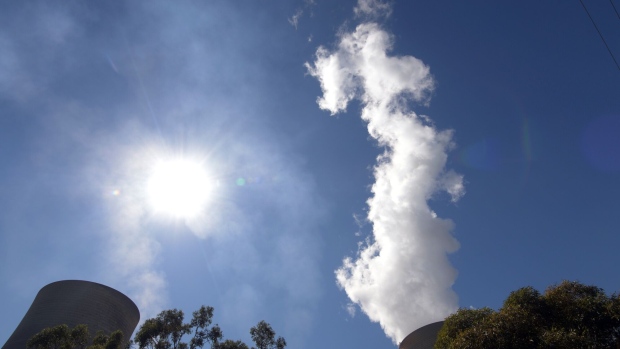Mar 26, 2023
Plan to Curb Coal, Gas Projects to Seal Australia Climate Pact
, Bloomberg News

(Bloomberg) -- Australia’s government expects to win approval for a flagship climate policy to rein in the country’s worst polluters after agreeing to rules that could curb development of new fossil fuel projects.
The country’s revised safeguard mechanism, which would compel around 215 of the nation’s most emitting industrial sites to cut greenhouse gas emissions by about 4.9% a year by 2030, will now be backed by the minor opposition Australian Greens and is likely to pass through Parliament before coming into operation from July.
Concessions around emissions limits, the use of carbon offsets and funding made to secure support of the Greens will likely make a host of potential coal and gas developments unviable, according to the party’s leader Adam Bandt.
“For the first time, new projects, coal and gas, will now have to undergo a pollution test,” he told reporters in Canberra on Monday. “About half” of the 116 new coal and gas projects under consideration in Australia would not be able to go ahead under the new proposed legislation, he said.
Key energy producers, including BHP Group Ltd. and Santos Ltd., declined in Sydney trading on Monday. Woodside Energy Group Ltd., the country’s largest liquefied natural gas producer, fell 3.4%.
An overhaul of the safeguard mechanism is seen as vital for Prime Minister Anthony Albanese to achieve Australia’s upgraded 2030 target for emissions reductions. The policy is intended to mandate tougher climate action for the entities it covers, which together account for around a quarter of Australia’s total emissions.
The revised plans announced Monday will offer at least A$1 billion ($665 million) for impacted industries that can support decarbonization efforts, including the steel and cement sectors. The funding won’t go toward any initiatives aimed at expanding the fossil fuel industry, the government said.
After negotiations with the Greens, there’ll be a limit on absolute emissions of 140 million tons a year, which will decrease over time. Energy Minister Chris Bowen will also need to carry out additional scrutiny of any project that threatens to breach that cap, potentially jeopardizing some fossil fuel developments, Bandt said.
But Albanese denied the new legislation would kill off investment in projects required for Australia’s clean energy transition, including new gas production, pointing out he had refused to concede to Green Party demands that new coal and gas projects be banned under the legislation.
An immediate ban on future gas projects would be “irresponsible,” Bowen said earlier this month, adding that the fuel will be necessary to complement a transition to the government’s target of 82% renewable generation by 2030.
Albanese’s Labor government came to power in May last year with a vow to reverse the nation’s reputation as a climate laggard. While the administration has tightened national emissions targets, Labor has also faced criticism over its support for some coal and gas developments.
“These reforms are crucial to our climate and our economy – supporting Australian industry and ensuring they will continue to be competitive in a decarbonizing world,” Bowen said in a Monday statement.
The main opposition center-right coalition of the Liberals and Nationals in February said it would vote against the proposed legislation.
(Updates with details from first paragraph, shares in fifth paragraph)
©2023 Bloomberg L.P.








